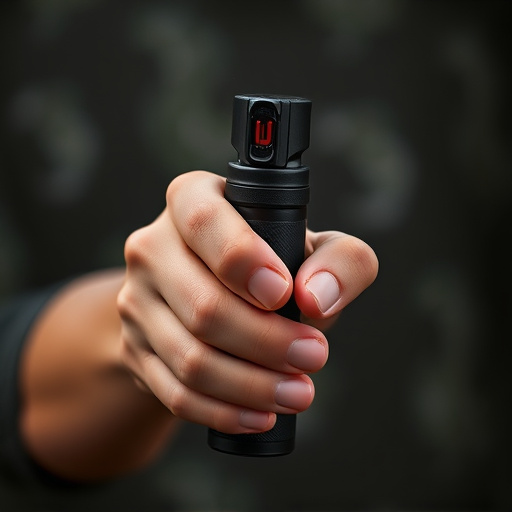Learn the art of legally carrying pepper spray – a valuable personal defense tool. Navigate regional laws and regulations to ensure compliance while empowering yourself. Select the right pepper spray, understand deployment guidelines, and debunk common myths for effective, responsible self-defense. Focus on key aspects like potency, range, local permits, age limits, storage, and "no-carry" zones (schools, courts, public transport) to legally carry pepper spray as needed.
Pepper spray, a potent deterrent, offers individuals an effective personal defense mechanism against potential threats. This article delves into the intricacies of pepper spray as a self-defense tool, exploring its legal framework for carrying, choosing the right option tailored to individual needs, and providing crucial safety precautions for optimal use. We also debunk common myths surrounding pepper spray, offering insights on how to legally carry it responsibly.
- Understanding Pepper Spray as a Defense Mechanism
- Legal Framework for Carrying Pepper Spray
- Choosing the Right Pepper Spray for Your Needs
- Effective Use and Safety Precautions
- Common Myths and Misconceptions About Pepper Spray
Understanding Pepper Spray as a Defense Mechanism
Pepper spray, officially known as capsaicin spray, has emerged as a powerful personal defense mechanism. It’s a non-lethal option that temporarily incapacitates an attacker by irritating the eyes and respiratory system. When used appropriately, pepper spray can give users time to escape potentially dangerous situations.
Understanding how and when to legally carry pepper spray is crucial. Different regions have varying laws regarding its possession and use. It’s essential to research and comply with local regulations, which often involve obtaining permits and meeting specific age restrictions. Knowing the legal framework surrounding pepper spray ensures its responsible use and can help individuals protect themselves effectively while staying within the law.
Legal Framework for Carrying Pepper Spray
The legal framework for carrying pepper spray varies significantly from one jurisdiction to another. Understanding how to legally carry pepper spray begins with knowing local, state, or provincial laws, as well as federal regulations if applicable. In many places, citizens can legally own and carry pepper spray for self-defense purposes, provided they obtain the necessary permits or licenses. These may include background checks, training requirements, and restrictions on the type and amount of pepper spray that can be possessed.
How to legally carry pepper spray involves adhering to specific guidelines regarding age limitations, storage, and transportation. Users must also be aware of “no-carry” zones, such as schools, courts, or public transportation hubs, where pepper spray is prohibited. Staying informed about the legal framework ensures compliance with the law while empowering individuals to protect themselves in situations that may arise.
Choosing the Right Pepper Spray for Your Needs
When considering pepper spray as a deterrent or self-defense mechanism, selecting the right type is paramount. Different pepper sprays offer varying levels of potency and range, catering to distinct needs. For close-quarters defense, a higher concentration with a shorter effective range might be suitable, while a lower concentration with a longer reach could be better for personal protection against potential attackers from a distance.
Understanding local laws regarding pepper spray possession and carry is essential before making a purchase. “How to legally carry pepper spray” guides vary by jurisdiction, so it’s crucial to check your area’s regulations. Many places require permits or registration, set age limits, and have restrictions on the type and quantity you can possess. Being informed ensures your rights while staying within legal boundaries.
Effective Use and Safety Precautions
To effectively utilize pepper spray as a deterrent or defense mechanism, it’s crucial to understand how and when to deploy it legally and safely. Pepper spray, also known as oleoresin capsicum (OC) spray, is designed to temporarily incapacitate an aggressor by causing irritation, coughing, and temporary blindness. However, its use must be proportional to the threat level and in accordance with local laws.
Before carrying pepper spray, individuals should familiarize themselves with their region’s regulations regarding self-defense tools. This includes understanding the legal limit for OC concentration, permitted usage scenarios, and any restrictions on where and how it can be carried (e.g., in a purse, holster, or pocket). Safety precautions are paramount; always aim for non-lethal zones like eyes, nose, and mouth, and keep a clear target in mind to minimize collateral damage. Regular training on spray technique and proper storage practices is essential to ensure its effectiveness and safety when needed.
Common Myths and Misconceptions About Pepper Spray
Common Myths and Misconceptions About Pepper Spray
One of the most prevalent myths surrounding pepper spray is that it’s a foolproof defense, rendering any aggressor instantly incapacitated. While pepper spray can certainly disable an assailant by causing severe irritation to the eyes and respiratory system, its effectiveness varies based on factors like distance, weather conditions, and the target’s physical resilience. It’s crucial to understand that pepper spray is not a lethal weapon; it disorients and temporarily incapacitates, giving users time to escape or defend themselves further.
Another misconception is that pepper spray is only for law enforcement and self-defense enthusiasts. However, many jurisdictions allow civilians to legally carry pepper spray for personal protection. How to legally carry pepper spray differs by region, so understanding local laws is essential. Knowing the legal boundaries ensures individuals can protect themselves while adhering to the law, dispelling the notion that carrying pepper spray is exclusive or reserved for a select few.
Pepper spray, as a personal defense mechanism, offers individuals a powerful tool for self-protection. Understanding its legal implications and choosing the right product is crucial. By knowing how to legally carry pepper spray and following safety precautions, you can ensure its effectiveness while mitigating risks. Dispelling common myths will further empower users to make informed decisions and stay safe in various situations.
